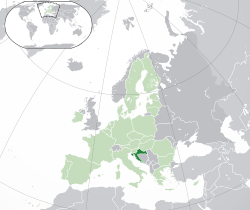This article includes a list of general references, but it lacks sufficient corresponding inline citations .(November 2024) |
 | |
Croatia | European Union |
|---|---|
Croatia has been a member of the European Union since 2013.
This article includes a list of general references, but it lacks sufficient corresponding inline citations .(November 2024) |
 | |
Croatia | European Union |
|---|---|
Croatia has been a member of the European Union since 2013.
The accession of Croatia to the European Union was completed in 2013.
Croatia first hosted the rotating Presidency of the Council of the European Union in the first half of 2020.
The country adopted the euro as its currency and joined the Schengen Area in 2023. [1]